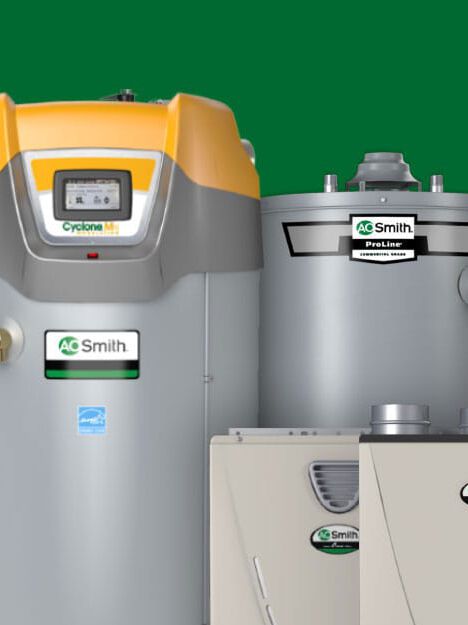
Pros and Cons of Different Types of Water Heaters
Table of Contents
Water heaters are one of the hardest-working appliances in a home, ensuring there’s hot water for washing dishes, doing laundry, bathing and cleaning. Several types of water heaters are available, including gas, electric, solar-powered and hybrid models. Read on to learn about the pros and cons of different water heaters and their suitability for your home.
Conventional Storage Tank Water Heater
Conventional storage-tank water heaters have a standing supply of heated water ready for use. With these systems, electricity or gas is used to heat and maintain water at a consistent temperature in an insulated tank. As you use hot water, cold water enters the bottom of the tank, where it’s heated and stored for later use.
Advantages of an Electric Storage Tank Water Heater
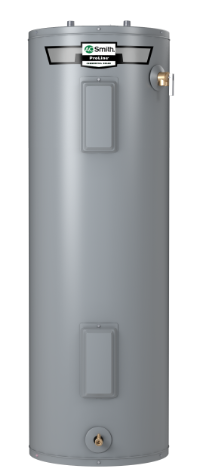
Easy and Affordable Installation
Electric water heaters are straightforward to install, as most homes are already equipped with electricity. Installation rarely requires modifications to electric or plumbing systems.
No Need for Venting
Because electric water heaters don’t create by-products, you don’t need to vent them outdoors to eliminate combustion gasses. This makes them a good option for small or enclosed spaces where it’s difficult to install venting.
Lower Upfront Cost
Electric water tank heaters are less expensive than their gas counterparts. They rely on electric heating elements to warm water, which are cheaper to manufacture than gas burners and ignition systems. The lower price point and simple installation process usually result in a lower initial investment.
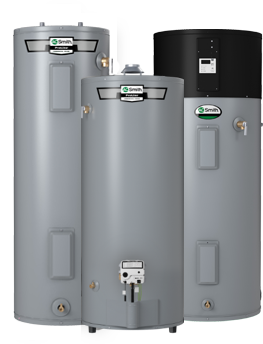
Disadvantages of an Electric Storage Tank Water Heater
Higher Operating Costs Over Time
In most jurisdictions, electricity is more expensive than natural gas. Some electric companies also charge premium rates during peak hours, which can increase your operating costs.
Slower Recovery
Because it takes longer to heat large volumes of water using electricity than gas, you may have to wait longer for hot water to replenish. This slower recovery time adds to your operating costs if you have a high demand for hot water.
Advantages of a Gas Storage Tank Water Heater

Faster Water Heating
Equipped with burners, gas water heaters heat water faster than electric models. This lowers energy consumption and boosts recovery time, ensuring hot water is readily available for bathing, laundry and cooking.
Generally Lower Operating Costs
Natural gas usually costs less than electricity, resulting in lower utility bills. The faster recovery time also reduces the amount of energy needed to heat water. If you choose a gas water heater that uses condensing technology, you can also recover some of the energy used to heat the water for greater efficiency.
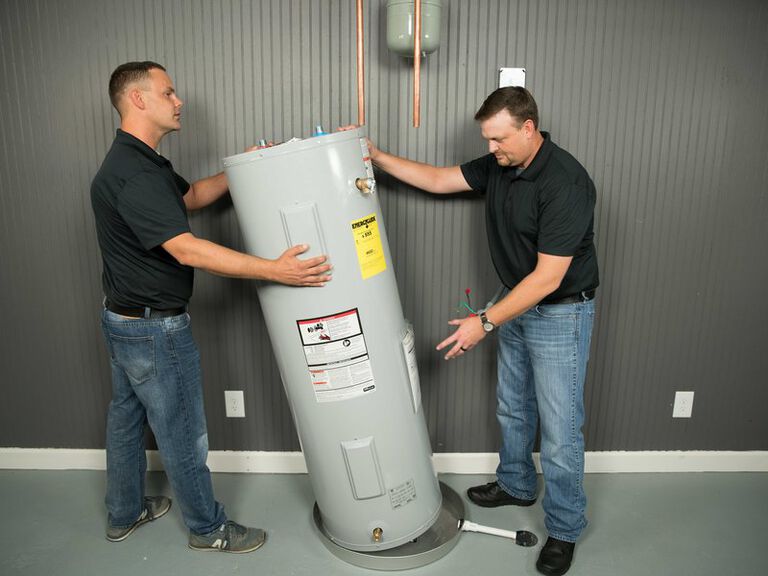
Disadvantages of a Gas Storage Tank Water Heater
Requires Venting
Gas-powered water heaters create byproducts, such as carbon dioxide and water vapor, that must be vented from your home. When installing these units, you must satisfy space and ventilation requirements. A licensed professional can recommend an appropriate venting system for your gas water heater, ensuring your unit operates safely and efficiently.
Higher Upfront Cost
Gas storage tank water heaters are more expensive than electric ones. The installation process involves more, so you may incur extra labor or material costs to lay or upgrade gas lines and install venting systems.
Regulation Changes
Some jurisdictions, such as California, are introducing rules to reduce reliance on fossil fuels and promote renewable energy resources. Depending on local regulations, you might be restricted from installing natural gas water heaters in new construction or when upgrading your home.
Tankless (On-Demand) Water Heater
Tankless water heaters use electricity or gas to heat water on demand, eliminating the need for a storage tank. Unheated water is drawn into the unit when needed. It flows through the heat exchanger, which brings water to the desired temperature and immediately delivers it to the faucet or appliance.
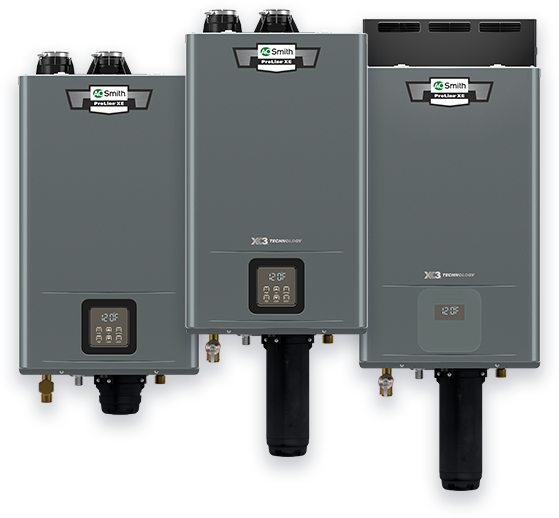
Advantages of an Electric Tankless Water Heater
No Standby Heat Loss
Since tankless water heaters aren’t continuously heating water, they’re more energy efficient than units with tanks. They avoid the standby heat loss that occurs when heat from stored hot water escapes to the surrounding environment.
Compact Size
When it comes to tank vs tankless water heaters, ones without tanks are small and light. These streamlined units offer more flexibility for installation and can be placed on a wall to free up floor space.
Suitable for Smaller Spaces
With a smaller footprint, tankless water heaters are ideal for small houses, apartments, cottages and tight spaces. They can fit into closets and cabinets and under sinks, reducing the need for a standalone utility room. Depending on the climate, they can also be installed outdoors.
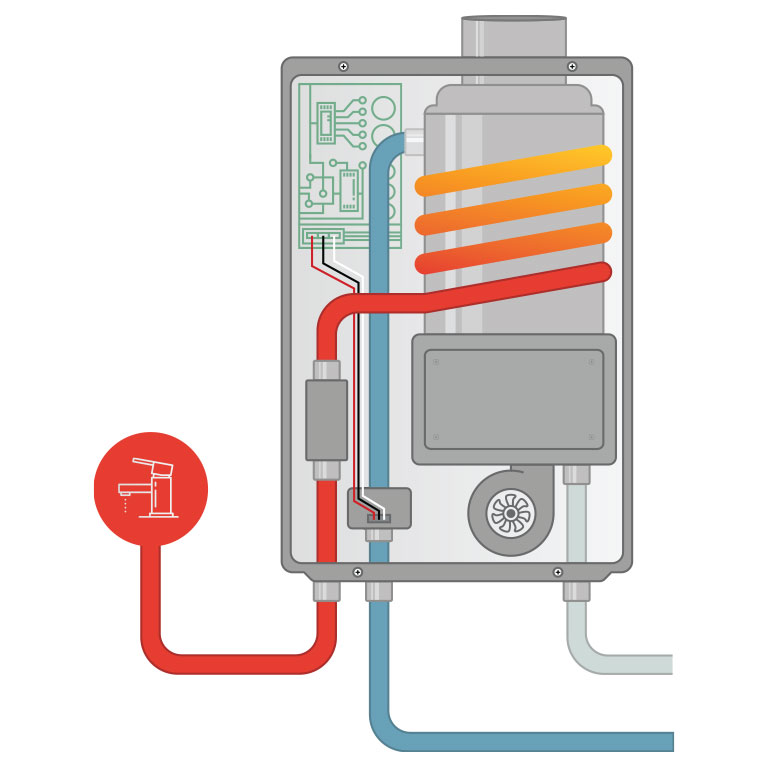
Disadvantages of an Electric Tankless Water Heater
Limited Hot Water Output for Simultaneous Use
Tankless electric water heaters have a limited flow rate. They usually provide enough gallons of hot water per minute to manage a shower or load of laundry but struggle to keep up with multiple demands simultaneously. If you’re running a washing machine, dishwasher and bath simultaneously, you will experience reduced water flow or cooler water temperatures.
Advantages of a Gas Tankless Water Heater
High Hot Water Output
Powered by gas burners, natural gas tankless water heaters have a greater heating capacity than units with electrical heating elements. Gas models heat water quickly and offer higher flow rates to satisfy household demands.
Energy Efficient
Instead of continuously heating water stored in a tank, tankless water heaters operate only when hot water is needed. They consume less energy overall than tank water heaters without standby heat loss. Depending on how much water a household uses, tankless models are 8% to 34% more energy efficient, according to the U.S. Department of Energy.
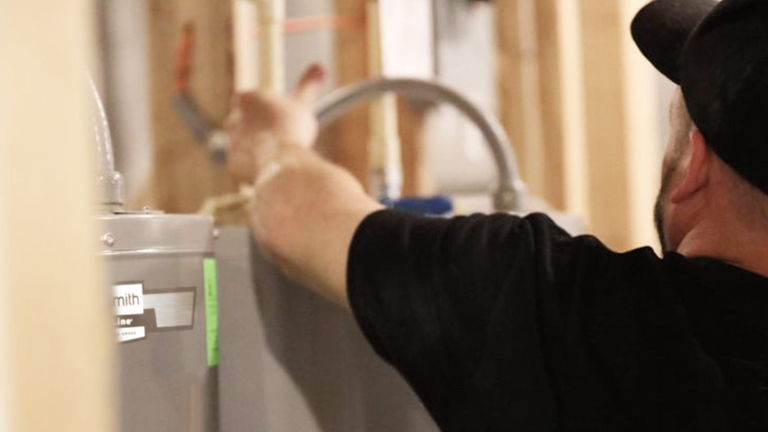
Disadvantages of a Gas Tankless Water Heater
Higher Upfront Cost
Designed with combustion and venting components, gas tankless water heaters are more expensive than electric ones. You’ll pay more at the point of purchase and to install them.
Complex Installation
For safety reasons, gas water heaters are more time-consuming to install than electric units. You may need access to gas lines, fresh air intake for combustion and venting to remove harmful gasses from the home. A certified gas installer can ensure your tankless gas water heater meets building and safety code regulations.
Heat Pump Water Heater

A heat pump water heater is equipped with a tank to store hot water and an electric heat pump as an energy source. The heat pump captures heat from the surrounding environment and transfers it to the water.
Advantages of an Electric Heat Pump Water Heater
Energy Efficient
Heat pump water heaters use electricity to pull heat from the air and transfer it to the water tank. It takes less energy to move existing heat than it does to create heat, making these water heaters an energy-efficient option.
Suitable for Moderate Climates
Heat pump water heaters are well-suited for regions with mild winters and warm summers. Temperatures in these climates tend to be warm and stable year-round, providing enough heat to benefit from these water heaters' energy efficiency and cost savings.
Disadvantages of an Electric Heat Pump Water Heater
Lower Efficiency in Colder Climates
In colder climates, heat pump water heaters struggle to extract enough heat from the ambient air to increase water temperatures to the desired level. The backup electrical heating elements will kick in to compensate for the lack of heat, which offsets the unit’s energy efficiency.
Condensing Water Heater
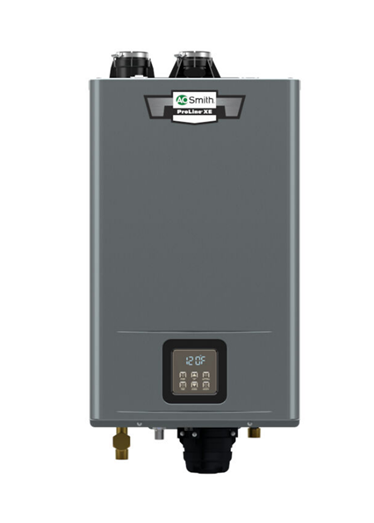
Advantage of a Gas Condensing Water Heater
Lower Operating Costs
Condensing gas water heaters capture the heat from combustion gasses, using less energy. This reduces monthly gas consumption and saves money while delivering the same amount of hot water.
Disadvantages of a Gas Condensing Water Heater
Higher Upfront Cost
Condensing water heaters typically cost more than non condensing models. The condensing technology requires extra components, such as a secondary heat exchanger, a venting system for cooler gasses and a drainage system, adding to the manufacturing cost.
Special Venting Required
Condensing water heaters have unique venting requirements because the hot combustion gasses aren’t immediately expelled outdoors. Once the heat is captured, the gasses are cooler and contain more moisture and acid. A special corrosion-resistant venting system is needed to handle the cool gasses and condensate.
How to Choose the Right Water Heater for Your Needs
Choosing the right water heater for your home involves decisions about fuel type, energy efficiency and heating capacity. You should also consider the space where you’re installing the water heater and your local climate. Our water heater selector tool can help you navigate your choices.
Contact an A. O. Smith Rep
Your local A. O. Smith representative can provide expert guidance on the types of hot water heaters and the features and benefits of various models. Whether you’re considering a heat pump water heater or comparing a tankless water heater vs tank models, they can help you find the best solution for your household needs and budget.
Problems With Your Tankless Water Heater?
When experiencing issues with your tankless water heater, look up your specific model on the A. O. Smith website. You’ll find comprehensive resources, including guides, videos and manuals for basic troubleshooting.
Contact a Service Provider
A professional technician can accurately diagnose and fix your tankless water heater. Find an authorized A. O. Smith service provider near you and schedule an appointment for maintenance or repair.
Want to Upgrade Your Water Heater?
It may be time to upgrade your water heater, whether you’re looking for a more energy-efficient option or replacing an older model before it fails. You may want to switch fuel types, opt for a tankless style or choose a water heater with greater capacity.
Contact an A.O. Smith Rep
Reach out to an authorized local contractor in your community for help in choosing and purchasing a water heater. They can also ensure your water heater is installed correctly and meets safety standards and regulations.
Problems with Your Water Heater?
Water heaters need regular maintenance to perform their best, but problems can arise. You can find documentation on the A. O. Smith website to troubleshoot your specific model. If you’re experiencing fluctuations in water temperature, low water pressure, leaking or error codes, consult a professional technician.
Contact A. O. Smith’s Support Team
For questions about our gas, electric, tank and tankless water heaters, contact A. O. Smith’s customer and technical support team. They can answer your questions and suggest next steps.